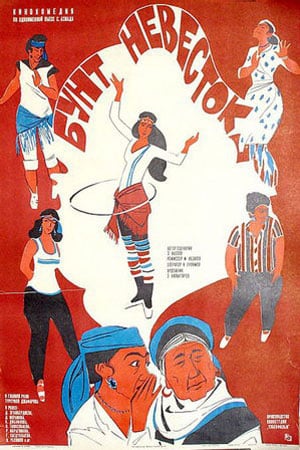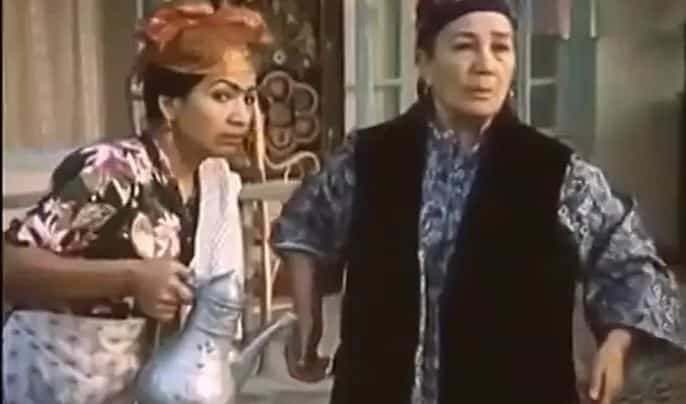The Rebellion of the Brides (Kelinlar qoʻzgʻoloni/Бунт невесток) is one of the most famous films released in Uzbekistan under the Soviet Union in 1984. The film is available for free on YouTube from the studio. The original was shot with both Uzbek and Russian used in the dialogue. Another version is also available online from the studio with all dialogue in Russian.
This comedy was controversial at the time of its release. It addresses what were important social issues of the time, pitting conservative and progressive values against each other in a comedy. This very basis – mixing comedy with commentary on deep social and philosophical issues – led many to accuse The Rebellion of the Brides of being flippant; statements like “What’s the purpose? I don’t get it” and “They are making fun of our old mothers” appeared in the press.

One of the main characters is a respected senior woman, Farmonbibi, who is loving, hardworking, wise, and honest. However, she is seen as very conservative, strict, and assertive as well. Farmonbibi experienced difficulties throughout her life, including losing her husband, which led to the need to raise seven sons as a single mother. The film is about her ruling over a big house, where the extended family, including her sons and their families, live a traditional lifestyle together. At the time, it was common in Uzbekistan for sons to not move out even after marriage and instead remain in the household ruled by their elders.
Farmonbibi seems despotic and prudent at the beginning of the film, holding back the daughters-in-law and the grandchildren from any foolishness they may get into. Things take a turn when her youngest son gets married to a gymnast, Nigora, who moves in from the city, and who is not used to the traditions the family follows. She goes against the established system and resists Farmonbibi, attracting sympathy and interest from the other daughters-in-law. Serious complications in the household then arise.
The Rebellion of the Brides was produced by Uzbekfilm, a Tashkent-based film studio established in 1925 that is still producing films today. The film’s director was Melis Abzalov, who was famous for his acting in Uzbek movies like Adventures of Arslan (Приключения Арслана) and The Seventh Bullet (Седьмая пуля). The Rebellion of the Brides was based on a play of the same name by Uzbek playwright Said Ahmad. Ahmad was a multi-awarded national writer who sought to draw a philosophical generalization from each event he described in his stories. It was adapted for the screen by Eduard Akopov, an Azerbaijani writer who was already well known before working on this project.
There were around 20 actors who participated in the making of the film. Farmonbibi was played by respected actress Tursunoi Dzhaffarova, who also worked on well known projects like Bring Back Grandma (Верните бабушку), Street of Thirteen Poplars (Улица тринадцати тополей), and Yor-yor (Где ты, моя Зульфия?). Nigora, the rebellious bride who tried to fight for her rights, was played by Dilorom Egamberdiyeva, who got her education in Moscow and was awarded “Honored Artist of Uzbekistan” in 1995. Navi Rahimov played the role of Uncle Boqi. Rahimov was a WW2 veteran who taught acting for years at the Tashkent University of Theater and Fine Arts, and was named a People’s Artist of Uzbekistan in 1964.
Both the play and the film, however, gained fame. Both had an impact that’s seen even today when people use the characters to refer to real-life situations, like, “His mother-in-law is a real Farmonbibi.” Not only did the story have a cultural impact, but also reflects the values of Uzbek culture. Uzbek scholar Sanjar Eshmurodov mentions in an article “Komediyaga Jiddiy Nazar” in the online newspaper Hurriyat that the ideas of a big family living together, the sons’ respect and loyalty for their mothers, the harmony of the brides, and the concept of underlying love behind the anger and strictness of a strong mother, which are all portrayed known as stereotypical conservative ideals, are all portrayed in the film. Moreover, the reflection of real-life problems like disagreements between family members, the generational conflicts they overcame, and the social life of society as a whole of that time was a big part of this story. The article also compared the system that was running in that household to the political one of the USSR, mentioning how Farmonbibi collects bills from the sons and daughters-in-law at the end of every month, just like the government of the USSR did, seizing and appropriating the underground resources of the fifteen dependent republics and submitting a plan at the end of every year. Additionally, Farmonbibi gives her sons 1 som just for going to work, similar to the funds given to the colonial republics for their survival.
The Rebellion of the Brides shows the lifestyle of a big traditional Uzbek family in a Soviet suburb in Uzbekistan. Because the story takes place during the early 80s, many old sayings and behavior show a mentality not common today. However, some things that it shows have not changed and the movie can serve as a window for people who want to learn about traditional clothes, day-to-day life, and the meaning of community in Central Asia.
Both the play and film remain popular throughout the Caucuses, Central Asia, and Russia. It is often staged in Russia or in translation to local languages.
The Russian and Uzbek used in the original film is spoken quite clearly. We have not found, however, a copy that offers subtitles in Russian or English, which can make it a little difficult for the intermediate speaker to keep up. Overall, however, this film is entertaining and informative. Watch the film in Russian here:
Or in Ubek!











